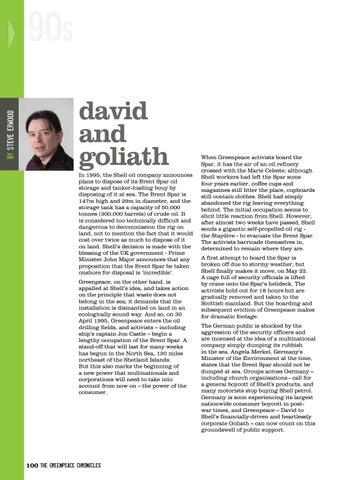by steve erwood
90s david and goliath In 1995, the Shell oil company announces plans to dispose of its Brent Spar oil storage and tanker-loading bouy by disposing of it at sea. The Brent Spar is 147m high and 29m in diameter, and the storage tank has a capacity of 50,000 tonnes (300,000 barrels) of crude oil. It is considered too technically difficult and dangerous to decommission the rig on land, not to mention the fact that it would cost over twice as much to dispose of it on land. Shell’s decision is made with the blessing of the UK government - Prime Minister John Major announces that any proposition that the Brent Spar be taken onshore for disposal is ‘incredible’. Greenpeace, on the other hand, is appalled at Shell’s idea, and takes action on the principle that waste does not belong in the sea; it demands that the installation is dismantled on land in an ecologically sound way. And so, on 30 April 1995, Greenpeace enters the oil drilling fields, and activists – including ship’s captain Jon Castle – begin a lengthy occupation of the Brent Spar. A stand-off that will last for many weeks has begun in the North Sea, 120 miles northeast of the Shetland Islands. But this also marks the beginning of a new power that multinationals and corporations will need to take into account from now on – the power of the consumer.
100 THE GREENPEACE chronicles
When Greenpeace activists board the Spar, it has the air of an oil refinery crossed with the Marie Celeste; although Shell workers had left the Spar some four years earlier, coffee cups and magazines still litter the place, cupboards still contain clothes. Shell had simply abandoned the rig leaving everything behind. The initial occupation seems to elicit little reaction from Shell. However, after almost two weeks have passed, Shell sends a gigantic self-propelled oil rig the Staydive - to evacuate the Brent Spar. The activists barricade themselves in, determined to remain where they are. A first attempt to board the Spar is broken off due to stormy weather, but Shell finally makes it move, on May 22. A cage full of security officials is lifted by crane onto the Spar’s helideck. The activists hold out for 18 hours but are gradually removed and taken to the Scottish mainland. But the boarding and subsequent eviction of Greenpeace makes for dramatic footage. The German public is shocked by the aggression of the security officers and are incensed at the idea of a multinational company simply dumping its rubbish in the sea. Angela Merkel, Germany’s Minister of the Environment at the time, states that the Brent Spar should not be dumped at sea. Groups across Germany – including church organisations - call for a general boycott of Shell’s products, and many motorists stop buying Shell petrol. Germany is soon experiencing its largest nationwide consumer boycott in postwar times, and Greenpeace – David to Shell’s financially-driven and heartlessly corporate Goliath – can now count on this groundswell of public support.
